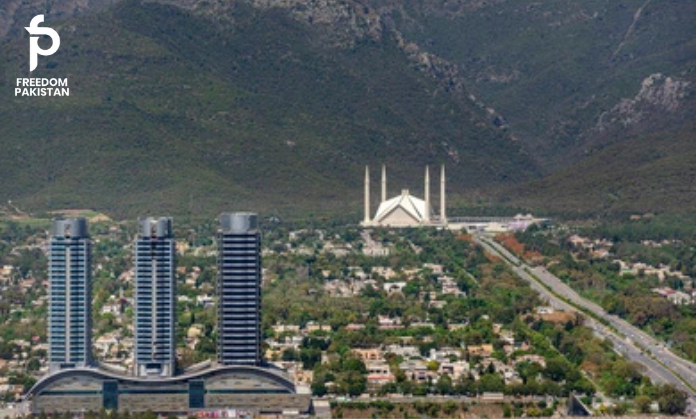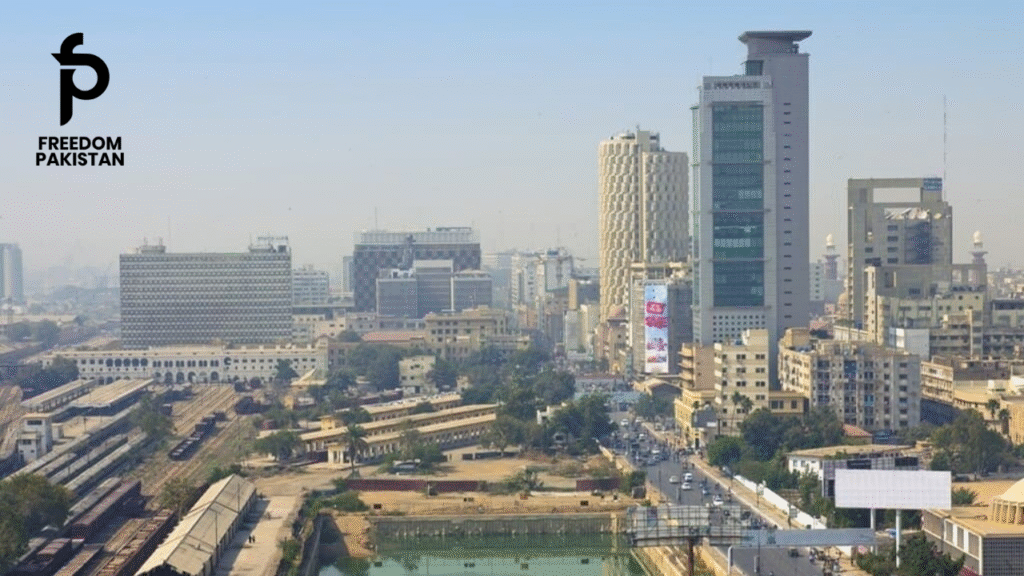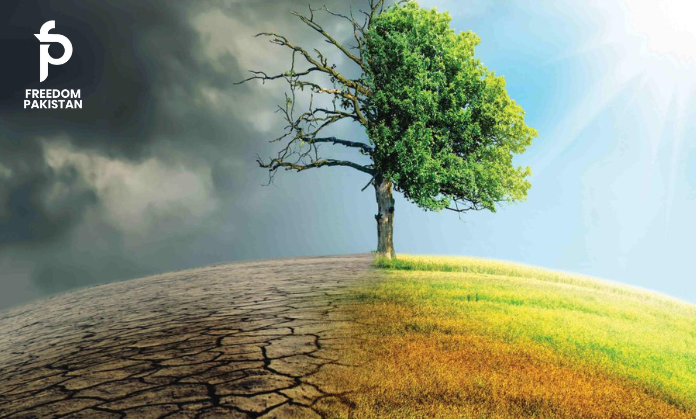Table of Contents
ToggleIslamabad Faces Scorching Heatwave and Margalla Hills Fire: Authorities on High Alert
Islamabad, the capital city of Pakistan known for its green landscapes and relatively moderate weather, recently experienced one of its hottest days in history. According to the Pakistan Meteorological Department (PMD), temperatures soared to a sweltering 45°C — just a fraction below the city’s all-time record of 46.6°C, which was set in June 1994. This sudden and extreme rise in temperature has sparked concern among citizens and authorities alike, highlighting the growing impact of climate change and the urgent need for environmental protection and public awareness.
A Heatwave That Shook the City
The scorching weather took many residents by surprise. Streets were deserted during the afternoon as people sought refuge indoors. Commercial activity slowed down, and those who had to venture outside were seen shielding themselves with umbrellas, scarves, or wet towels.
Dr. Mohammad Hanif, a senior meteorologist at the PMD, explained that the ongoing heatwave is a result of a high-pressure system developing over central and northern Pakistan. This system has blocked cooler winds and created an environment that traps heat, causing temperatures to rise dramatically. He mentioned that the intense heat is not just limited to Islamabad but has affected several parts of Punjab and Khyber Pakhtunkhwa as well.
Dr. Hanif added a glimmer of hope for residents by announcing that rainfall is expected in the coming days. “Rainfall in the region can significantly lower temperatures and improve the overall weather conditions,” he said. “We are monitoring the situation closely, and the public will be informed accordingly.”
Impact on Daily Life
The unbearable heat has impacted all aspects of life in Islamabad. Schools had to adjust their schedules, allowing students to leave early to avoid the peak heat hours. Hospitals reported an increase in heat-related illnesses, such as dehydration, heat exhaustion, and heatstroke. Medical professionals have advised citizens, especially children and the elderly, to remain indoors, drink plenty of fluids, and avoid unnecessary exposure to the sun.
Power outages in some parts of the city added to the distress. As demand for electricity surged due to increased use of air conditioners and fans, many areas experienced load-shedding. This made it even more difficult for residents to cope with the high temperatures.
Workers in outdoor professions, such as construction laborers, delivery drivers, and street vendors, were among the most affected. Several companies reduced working hours or gave time off to help employees avoid the worst of the heat.
A Fire Breaks Out on the Margalla Hills
As if the intense heat wasn’t enough, a fire broke out in the scenic Margalla Hills — a popular hiking and recreational spot in Islamabad. The fire was reported during the peak of the heatwave and quickly spread due to dry conditions and high temperatures.
Eyewitnesses saw thick plumes of smoke rising from the hills and alerted authorities. Many onlookers captured the fire on their phones, and videos quickly circulated on social media, sparking outrage and concern. The visuals showed flames consuming vegetation, threatening both the natural environment and the wildlife that call the Margalla Hills home.
Initial investigations suggest that the fire was caused by human negligence. Officials believe that someone may have carelessly discarded a burning cigarette or another flammable item, which ignited the dry grass and bushes. This kind of reckless behavior has unfortunately become a common cause of forest fires, especially during the hot and dry season.
Swift Response from Authorities
The district administration acted swiftly to contain the fire. More than 50 firefighters were immediately dispatched to the scene. Equipped with water tanks, hoses, and fire extinguishers, the teams worked tirelessly in the intense heat to bring the flames under control.
Helicopters were also deployed to assess the extent of the damage and assist in aerial firefighting. Volunteers and rescue teams from the Capital Development Authority (CDA) and the Islamabad Wildlife Management Board (IWMB) joined the efforts, ensuring a coordinated response.
Thanks to the quick and dedicated actions of the firefighting teams, the fire was eventually contained before it could cause widespread damage. However, a significant portion of the forested area was affected, and the full extent of the ecological damage is still being assessed.
New Rules to Prevent Future Fires
In response to this incident, the local administration has introduced strict new regulations to prevent similar occurrences in the future. Authorities have banned all public gatherings and recreational activities in forested areas of the Margalla Hills National Park until further notice.
“These measures are necessary to protect the natural environment and ensure the safety of both people and wildlife,” an official spokesperson stated. “We cannot allow careless human actions to endanger such a vital ecological area.”
Security personnel have been instructed to patrol the area more frequently and issue fines to those violating the new rules. Awareness campaigns are also being launched to educate the public about the dangers of forest fires and the importance of preserving natural habitats.
The Importance of Margalla Hills
The Margalla Hills are more than just a beautiful landscape. They form a critical part of the ecosystem in the region. Home to hundreds of species of birds, mammals, and reptiles, as well as countless plant varieties, the hills play a crucial role in maintaining biodiversity.
In addition to their ecological significance, the hills serve as a major attraction for tourists and nature lovers. The hiking trails, viewpoints, and picnic spots are popular with families and fitness enthusiasts alike. Fires like the recent one not only damage the natural beauty of the area but also threaten the delicate balance of wildlife.
Forest fires also have long-term consequences. The destruction of vegetation leads to soil erosion, loss of wildlife habitats, and reduced air quality. In some cases, it can take years for the ecosystem to recover.
Climate Change and the Bigger Picture
Experts believe that the combination of the heatwave and the forest fire is not just a coincidence. These events are becoming more frequent and intense due to climate change. Global warming is causing temperature patterns to shift, resulting in longer and more severe summers in regions like Pakistan.
Meteorologists have warned that such heatwaves may become the new normal if climate change is not addressed through serious policy and lifestyle changes. Rising temperatures not only make life uncomfortable but also pose serious threats to health, agriculture, and the environment.
Environmentalists are urging the government and the public to take action. Steps such as planting more trees, reducing the use of fossil fuels, conserving water, and promoting public transportation can help mitigate the effects of climate change.
Family of Deceased Govt Servant to Receive Pension for Only 10 Years
You Can Also Read This Article
Public Advised to Stay Safe
With temperatures expected to remain high in the coming days, the government has issued several safety guidelines for the public. These include:
-
Avoid going outside between 11 a.m. and 4 p.m., when the heat is at its peak.
-
Stay hydrated by drinking plenty of water throughout the day.
-
Wear light-colored, loose-fitting clothing made of breathable fabrics.
-
Use hats, umbrellas, or other protective gear when outdoors.
-
Keep windows and curtains closed during the hottest part of the day to keep homes cool.
-
Check on elderly relatives, neighbors, and pets to ensure they are safe and hydrated.
-
Report any signs of fire immediately to the authorities.
A Call for Responsibility
The recent events in Islamabad serve as a powerful reminder of how fragile our environment is and how quickly it can be damaged by negligence or a lack of awareness. While natural disasters and weather extremes may not always be preventable, human actions play a significant role in either worsening or alleviating their effects.
Citizens are being urged to act responsibly, particularly during extreme weather conditions. This includes disposing of waste properly, refraining from lighting fires in open areas, and supporting initiatives aimed at environmental conservation.
Conclusion
Islamabad’s recent heatwave and the Margalla Hills fire have shed light on the growing environmental challenges faced by the region. While the quick response of authorities helped prevent a major disaster, the incident underscores the importance of public awareness, responsible behavior, and proactive measures to protect nature.
As we brace for a hotter, drier future, it is crucial for individuals, communities, and governments to work together to combat climate change and preserve the natural beauty and safety of our surroundings.




